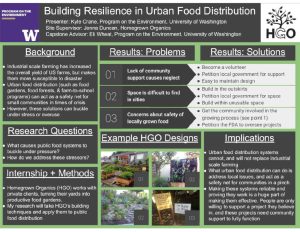Building Resilience in Urban Food Distribution
Development of industrial scale farming since the Great Depression has drastically increased the total yield of US agriculture, but has decreased the number of farms contributing. While this system is ideal for high output, the reduced number of farms can lead to boom and bust cycles of growth, and can leave communities with no easy access to produce, creating food deserts. Local urban agriculture methods such as food gardens, food forests, and farm-to-school projects aim to fill in the gaps caused by industrial scale farming, but are still vulnerable to certain stressors that can cause them to fail. These local food growing operations are often the last line of defense that keeps a family from going hungry, so any pressure placed on these operations is often directly felt by the community being served. My research aims to identify what causes these food systems to buckle under pressure, and how best to design them with resilience in mind. My research found that lack of ongoing support can cause projects to fail over time, with public school gardens being particularly vulnerable to this, as students and parents tend to only support the project as long as they are enrolled. Lack of continuous funding and volunteering creates strains on resources for urban food systems, and while government support could solve both of these issues, getting local government involved often requires having a successful proof-of-concept, which cannot happen without that funding.
